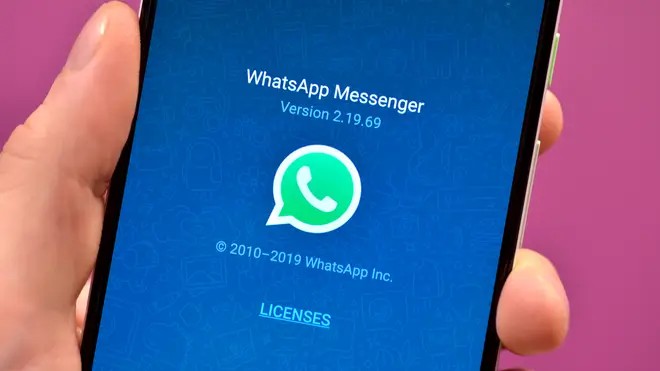
Matt Frei 10am - 12pm
14 June 2021, 08:04

The messaging platform has launched the privacy campaign in the UK and Germany.
WhatsApp said it is committed to user privacy, and believes encryption will play a key role in ongoing global security, as it launched its first global marketing campaign.
The messaging platform has launched a new ad campaign in the UK and Germany which it says has been designed to reiterate its “commitment to privacy”.
It comes in response to several months of uncertainty around the Facebook-owned app, after the announcement of a privacy policy update earlier this year which, combined with references to parent company Facebook, sparked confusion and concern among some users over possible increased data sharing – forcing WhatsApp to clarify the policy and delay its rollout.
WhatsApp boss Will Cathcart admitted that the incident had in part led to the creation of a marketing campaign around the platform, but it was also a chance for the company to make its case for using encryption.
“The idea is we’re going to communicate to people the benefits of privacy and encryption directly,” he said.
“What we’re really trying to do here is take end-to-end encryption, which is an abstract term, and help translate it to people.
“We view this as underscoring our commitment to privacy and encryption at a time which we think is particularly relevant because there continue to be attacks on it in some parts of the world, so we think it’s particularly important that consumers understand what it is and what’s at stake.”
Home Secretary Priti Patel has previously criticised Facebook’s plans to expand the end-to-end encryption already in use on WhatsApp to the messaging sections of its other apps – Instagram and Facebook Messenger – arguing that it puts children at risk and offers a hiding place for abusers and other criminals.
Mr Cathcart acknowledged that some people would still have questions about the system, but argued that those who criticise encryption often do so without also “connecting it to all the benefits” it can provide.
“It’s a really critical tool for people like journalists, activists, whistleblowers – we think people get that, but we believe it is a really critical tool beyond that – it’s for everyone,” he said.
“It keeps people safe from hacking. It protects people from fraud, it protects people from identity theft.
“It allows everyone to share sensitive information; their personal photos, their bank details, their health information.
“So we think it’s a level of security and privacy that people want. We know that the need is important to people – we know people want this level of privacy but we actually saw a lot of confusion around this earlier this year where people thought we might be starting to read their messages, so we really, really want to communicate it clearly.”
He admitted the company was “not clear enough” when it first announced the policy update and said that, as well as the new ad campaign, WhatsApp is in dialogue with governments about the benefits of the technology.
“We’re talking to governments all around the world, including in the UK, and making the point that encryption is absolutely a good thing. It protects the security and safety of citizens and it is absolutely essential,” he said.
“We are going to have all of our lives be digital over the next few years, in an increasingly hostile world full of hackers and hostile governments. It is critical. So we are absolutely making that point to governments everywhere.”
The campaign, which will include online, radio, TV and digital outdoor advertising, also comes as the platform faces new pressure from other encrypted messaging services, with many switching away from WhatsApp in the wake of the policy update confusion.
Although Mr Cathcart said the “overwhelming majority” of WhatsApp users have now agreed to the update, other services continue to see user growth, with app analytics firm App Annie reporting the largest engagement growth among private messaging apps in five years in research published at the end of 2020.
In response to WhatsApp’s campaign, the Home Office said the Government is in favour of strong encryption to protect citizens from harm online, but is concerned that Facebook’s implementation of the technology will blind law enforcement’s ability to access content.
“Social media companies like WhatsApp have a moral duty to protect children from horrific abuse on their platforms,” said Ms Patel.
“Facebook’s end-to-end encryption plans will be detrimental to law enforcement’s ability to tackle this abuse, as well as the risk posed by terrorists who wish to inflict maximum harm on the public.
“We must work together to find a mutually acceptable way to protect public safety without compromising user privacy.”